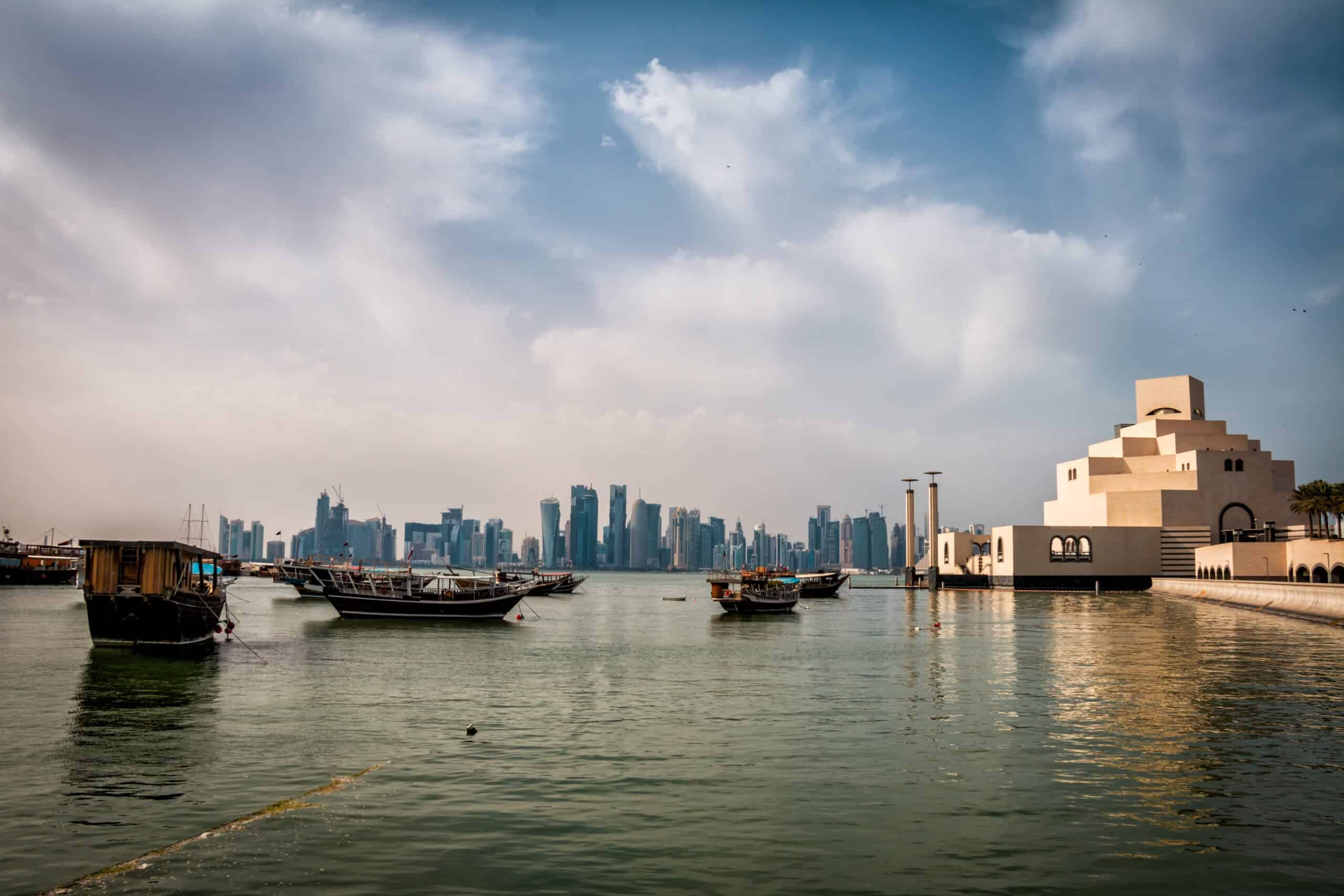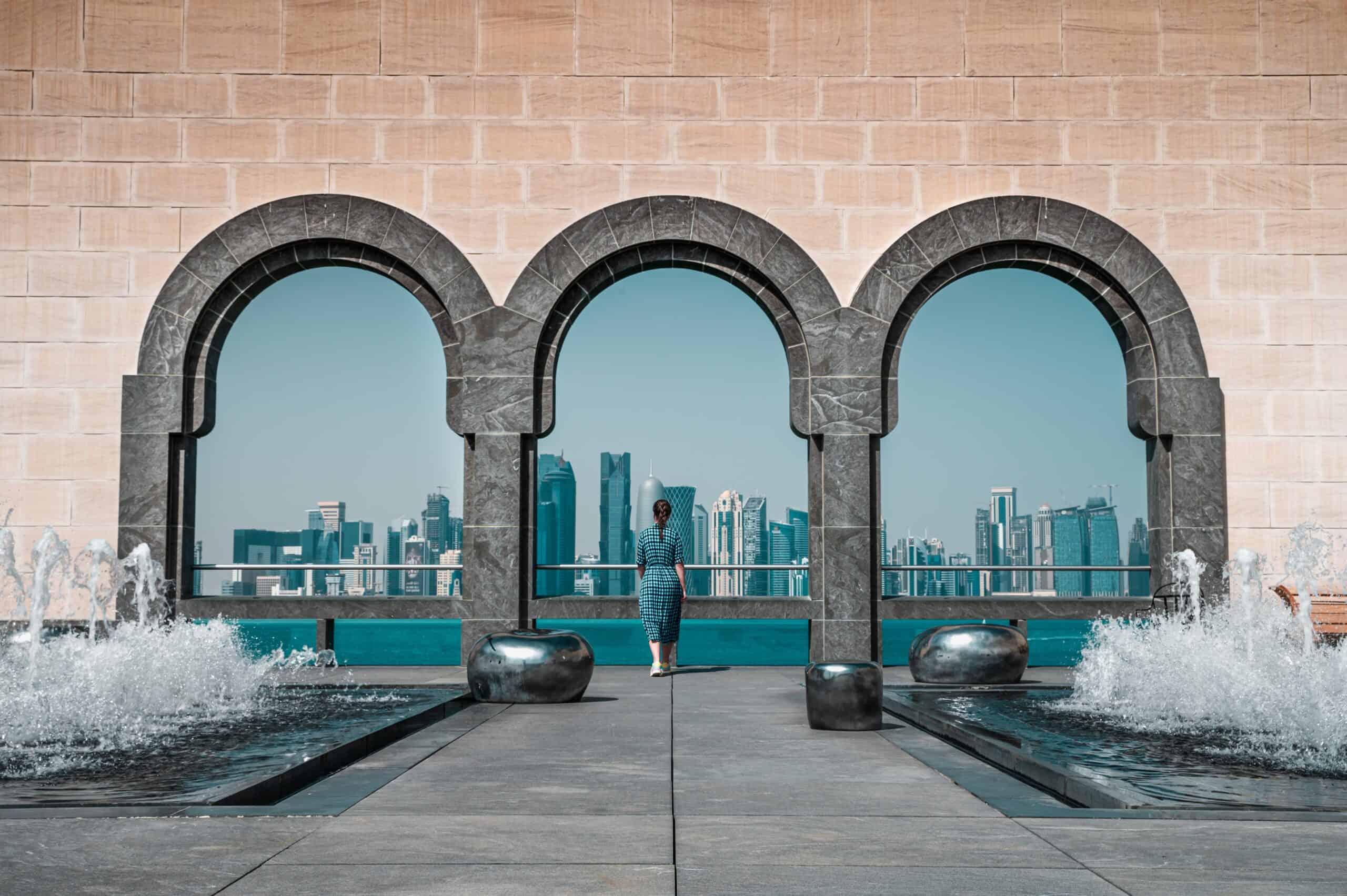
Doha city skyline of the 21st century Credit: Flavius Torcea via Unsplash
Now is the time to focus on Qatar
Now is a good time to learn about the Gulf state of Qatar because it will be hosting the 2022 football (soccer) World Cup and therefore front and centre on the world stage. The nation is also moving forward with a national plan to grow a diverse and sustainable economy by 2030.
Qatar is a constitutional monarchy with a small population of only 2.7 million people and a land area of 11,521 square kilometres, putting it on par with Sydney and Melbourne. Despite its small size, Qatar is an economic powerhouse because it sits above about one-third of the world’s known reserves of natural gas, even though its oil reserves are dwindling. Qatar adopted ambitious goals in its 2030 National Vision statement and aims to build a sustainable and resilient economy.
Diversification is the national business mantra, and Qatar’s economy is expanding as the nation prepares the necessary infrastructure it needs in place to ensure the World Cup is successful. There is also ongoing investment in the economy beyond the hydrocarbon sector. GDP per capita income is over $US 75000 per annum which translates into a strong consumer market for foreign luxury goods.
Qatar is a member of the Gulf Cooperation Council along with Kuwait, Bahrain, the United Arab Emirates, Saudi Arabia, and Oman. These close links make Qatar a strategic location for investment in the Gulf region for companies across technology, telecoms, health, education, science and infrastructure. The government is open to foreign investment and provides incentives for the right projects.

Museum of Historic Art, Doha, Qatar
Credit: Proriat Hospitality Partners & Proriat HoReCa Real Estate via Unsplash
The Qatari legal system
Qatar has been a constitutional monarchy since June 2013. The kingdom is led by the Emir His Highness Sheikh Tamim Bin Hamad Al-Thani. The emirate is hereditary. The country’s constitution was ratified by public referendum in 2003 and became effective in 2005 and mandates a separation of powers between the Emir and his council of ministers and the legislative branch consisting of an Advisory Council and the judiciary.
Qatar operates on a hybrid system of common law and Sharia and this can mean business regulation and financial services are complicated. The Qatari Stock Exchange supports economic growth by providing a well-regulated market platform. The financial services sector is also growing steadily and is one of the most sophisticated in the region.
Establishing a business presence in Qatar is not difficult, but it requires patience and attention to detail, such as ensuring the correct registration, obtaining a company seal and understanding the rules of tax compliance. However, you can approach this process with confidence as Qatar ranks well on Transparency International’s perceptions of corruption index. In some sectors, Qatari law requires any foreign company established there to have a minimum of 51 percent local ownership, so connecting with the right partner is essential.
The so-called “Proxy Law”—Law No. 25 of 2004 on the Combat of Covering up Illegal Practices Carried out by Non-Qataris—is in place to prevent non-citizens from operating clandestine businesses using a local proxy in some sectors of the economy. Exceptions are made for strategic industries which, in the past, have included agriculture, healthcare, education and several other key sectors. Decisions are often made on a case-by-case basis, and the list is regularly updated depending on the Qataris’ strategic investment needs. Therefore, you should make sure you have the latest information when planning a business incursion.
For foreign investors, several types of local partnership are available, and it is wise to get advice from a good local broker on the best arrangement, minimum capital requirements, and how to manage risk factors. The Ministry of Commerce and Industry provides gateway services for foreign investors.
As you’d expect, Arabic is the official language in Qatar but English is commonly used in business circles. The country is also home to an extensive expat workforce with diverse skills and ease of relocation. Expat employees must be sponsored in order to receive a Qatari work visa. International schools and access to world class universities means that expat families can assimilate with relative comfort. As an added bonus, employees pay no income tax.

Doha city through the arches of the Museum of Historic Art
Photo by Abdullah Ghatasheh from Pexels
Qatari business etiquette
Like many nations in the region, Qataris place a lot of emphasis on social politeness and respect. Networking is important and so is the exchange of business cards. It’s important not to rush in for a vigorous handshake, but to momentarily hold back to judge the right moment. This is particularly important when greeting businesspeople of the opposite gender. They may not wish to shake hands and so look for the appropriate signals. If in doubt, it’s better to respect the distance and not force any social intimacy. The alternative is to place your hand on your chest and nod while maintaining eye contact.
The business dress code in Qatar is conservative; suits are appropriate for both sexes and women should cover elbows and knees. However, women are not expected to wear elaborate head coverings, a simple scarf can be carried and used as appropriate. It’s also worth noting that women have a vital place in Qatari public life particularly in professional and educational settings.
Like most of its neighbours, Qatar is an Islamic country, so the sale and consumption of alcohol and pork products are strictly regulated. Qatar also celebrates the holy days of Eid Al-Fitr, also known as the month of Ramadan (usually April/May), and Eid Al-Adha (usually July or August).
Most importantly, reputation is everything. Don’t promise the world if you can’t deliver. However, the exchange of expensive and well-wrapped presents is an important part of Qatari business culture; just remember no alcohol, pork or pigskin.
Finally, expect to take your time as Qataris do not like to conduct business in a hurried fashion. Your guests may also be late to an appointment, which is not considered overly rude; but looking at your watch or eyeing the exit for a quick getaway is.
Qatar is a typical Arabic kingdom in many ways, but the FIFA World Cup in 2022 is likely to open the nation up to outsiders in a new way. Now is a good time to look forward and explore opportunities in the small but prosperous nation that combines Middle Eastern tradition with a booming economy, and a 21st century skyline, to reveal a fascinating cultural mosaic to the world.
Middle East Connect and Cultural Advisors (MECCA) can provide expert advice to smooth the path to successful business relationships with the GCC nations. Contact us today for an obligation-free discussion of your needs and how we can help.
LANGUAGE & CULTURAL BARRIERS CAN STOP OR DELAY YOUR BUSINESS FROM MOVING FORWARD TO REACHING YOUR GOALS
Previous posts in this series
The Gulf States are still in business
Sudan ready for strategic investors
Doing business in the MENA region
Doing business in Saudi Arabia
